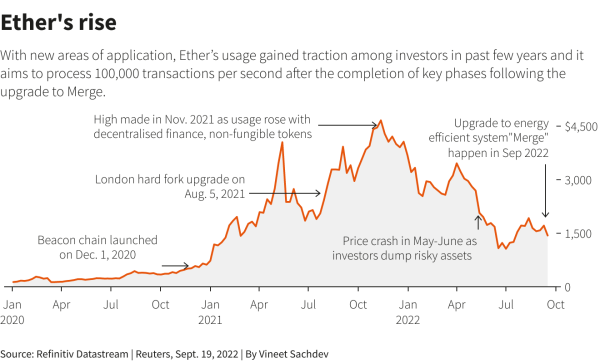Cryptoverse: After Merge, ether heads for a $20 billion Shanghai splurge

Souvenir tokens representing cryptocurrency networks Bitcoin, Ethereum, Dogecoin and Ripple plunge into water in this illustration taken May 17, 2022. REUTERS/Dado Ruvic/Illustration/File Photo
Sept 20 (Reuters) – The Merge came, saw and conquered. Not that you'd guess from crypto prices.
The Ethereum blockchain's mega-upgrade finally went live on Sept. 15, moving it to a less energy-intensive "proof of stake" (PoS) system with hardly a hiccup.
Even though anticipation of the event had seen ether rise about 85% from its June doldrums, it has since sunk 19%, hit along with bitcoin and other risky assets by investor angst over inflation and central-bank policy.
Nonetheless, many market players are bullish about the long-term prospects of Ethereum and its native cryptocurrency.
"Previously, we have talked to sovereign wealth funds and central banks to help build their digital asset allocations… but direct investment has been voted down due to energy concerns," said Markus Thielen, chief investment officer at asset manager IDEG Limited.
"With Ethereum moving to PoS, this clearly solves this last pillar of concern."
Some crypto investors are now turning their attention to the next event that could shake up prices.
The next significant upgrade for Ethereum is the "Shanghai", expected by market participants in around six months' time, which is aimed at reducing its high transaction costs.
It would allow validators, who have deposited ether tokens on the blockchain in exchange for a yield, to withdraw their staked coins, to hold or sell.
There's a lot at stake: over $20 billion of ether deposits are currently locked up, according to data provider Glassnode.
The staked ether crypto coin – viewed as a bet on Ethereum's long-term success as it cannot be redeemed until Shanghai happens – is trading at nearly parity with ether at 0.989 ether, according to CoinMarketCap data, indicating confidence in future upgrades.
The coin had dropped as low as 0.92 in June.
PURGE AND SPLURGE
Beyond Shanghai, a slew of other upgrades are planned for Ethereum, which co-founder Vitalik Buterin has nicknamed "the surge", "verge", "purge" and "splurge".
The primary focus of future upgrades is likely to be on the blockchain's ability to process more transactions.
"Because the Merge was delayed for several years, investors, traders, and end-users have a great deal of trepidation around when Ethereum will meaningfully scale," said Alex Thorn, head of firmwide research at blockchain-focused bank Galaxy Digital.
Paul Brody, global blockchain leader at EY, said: "Ethereum's future needs to, and will, scale to hundreds of millions of transactions a day."

Reuters Graphics Reuters GraphicsETHEREUM KILLERS
The Merge's primary goal was to reduce Ethereum's energy usage as cryptocurrencies come under fire for their massive carbon footprint. The blockchain's energy consumption was cut by an estimated 99.95%, the developers claim, which could tempt powerful institutional investors, formerly constrained by environmental, social and governance (ESG) concerns.
The Merge and future upgrades also dent the investment appeal of so-called "Ethereum killer" blockchains like Solana and Polkadot, said Adam Struck, CEO of venture capital firm Struck Crypto.
However, institutional investors aren't jumping in just yet, as a fearsome macro environment chills the waters of risk appetite.
Longer-term, though, the switch to PoS is expected to decrease the rate at which ether tokens are issued – potentially by up to 90% – which should drive up prices.
Additionally, annual yields of 4.1% for staking ether tokens to validate transactions could prove tempting for investors.
However, while the proof-of-stake method allows for these lucrative yields, many crypto purists point out that it moves Ethereum away from a purely decentralized model as the biggest validators could exercise greater influence over the blockchain.
For the time being, however, the Ethereum world might be advised to enjoy the Merge moment.
"There may be volatility in the days to come," said analysts at Kaiko Research. "But for now the community can take a well-earned victory lap."
Reporting by Lisa Pauline Mattackal and Medha Singh in Bengaluru; Editing by Pravin Char
Our Standards: The Thomson Reuters Trust Principles.
Opinions expressed are those of the author. They do not reflect the views of Reuters News, which, under the Trust Principles, is committed to integrity, independence, and freedom from bias.
Source:www.reuters.com



